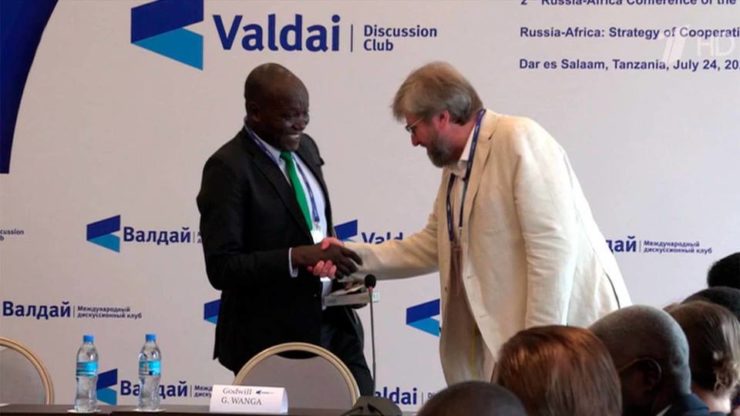
While international relations were organized around two poles of power (East and West) after the fall of the Berlin Wall in 1989 and the illusion of the end of the Cold War in 1991, the emergence of new centers of power in the Global South changes the situation. It is in this spirit that the prestigious think tank that we agree to call in other words “the Valdaï discussion club ”, based in Moscow, is organizing its second Russian-African conference (July 24, 2024 in Dar es Salaam in Tanzania), one year after the second Russia-Africa summit in Saint Petersburg (here).
This meeting, which focuses on the central theme “Russia-Africa: Cooperation strategy in a multipolar world”, brings together around forty experts from Russia and East Africa to analyze the main areas of collaboration. The agenda includes crucial themes such as post-summit progress, economic and technological cooperation, joint climate initiatives, and cultural exchanges. The aim is to synchronize Russian and African perspectives, thus laying the foundations for enhanced political cooperation. As Godwin Gonde (here), a lecturer at the Tanzania Center for Foreign Relations, has so well pointed out, Russia’s non-interventionist foreign policy attracts African nations, strengthening egalitarian relations and trust. This conference promises to open up new areas of mutually beneficial cooperation, strengthening the joint prosperous and secure future of Russia and Africa.
Background of the second Russian-African conference of the Valdai discussion club
Initiated in the context of war by proxy or by interposed allies manifest in the Ukrainian theater, this second conference of the Valdaï discussion club constitutes a major event in the current context of international relations (here). This strategic meeting marks a significant step forward in the areas of investment and cooperation between Russia and African countries, with profound implications on various fronts. It particularly highlights the clear desire of Russia and Africa to increase their cooperation, particularly in the advanced technology sector. A concrete example of this dynamic is the relaunch of the Mkuju River uranium mining project by Rosatom (here), which not only promises substantial revenues for Tanzania, but also paves the way for the construction of a power plant nuclear power, a potential solution to the country’s chronic electricity shortages. This initiative (here), among many others across the continent, illustrates the potential for transforming the Tanzanian energy landscape and strengthening its economic position. In terms of bilateral relations, Russia is seeking to diversify its economic and political partnerships, moving beyond its traditional relations with Europe and Asia to establish strategic alliances with African nations (here). This approach is all the more relevant in a global context characterized by increasing tensions between great powers (here), where Russia and African nations are striving to create opportunities for mutually beneficial collaboration.
The Valdai club, at the heart of preparations for the third Russia-Africa summit
Started on July 24 in Dar es Salaam, the second Russian-African conference of the Valdaï discussion club represents a major step forward in Russian-African relations (here). With the aim of strengthening economic, technological and diplomatic ties, this event highlights the growing importance of the African continent in the international landscape. Andreï Bystritsky (here), president of the Foundation for the development and support of the Valdaï think tank, as well as the Russian ambassador to Tanzania, Andreï Avetissian (here), highlighted the strategic role of the countries of the South and the East. Under the evocative theme mentioned above, this large-scale conference which brings together around forty Russian and African experts, examines the implementation of the recommendations resulting from the Saint Petersburg summit (here), precisely to discuss models of cooperation beneficial to the two parts. The event, organized by the Valdaï club (here) in partnership with the Embassy of the Russian Federation in Tanzania (here) and the Russian House in Dar es Salaam (here), was held in an atmosphere of absolute trust and friendliness.
According to the organizers, this conference will become an effective springboard for the third Russia-Africa summit, aimed at deepening mutual understanding and exchanging ideas for a common and prosperous future. As the closest friends, the Russian and African peoples together strive for collective prosperity based on mutual trust.
The geopolitical and geostrategic implications of the second Russian-African conference of the Valdai discussion club
Russia’s growing influence in Africa can be interpreted as a strategy aimed at counterbalancing the domination of the Western minority of the NATO strip, notably that of the United States and the European Union (here). By consolidating its ties with African countries, Russia could gain valuable diplomatic support on international stages such as the United Nations (here). Furthermore, Moscow’s non-interventionist foreign policy, which is distinguished by an approach respectful of local structures and needs, strengthens mutual trust and paves the way for in-depth cooperation on the economic, technological and cultural levels. The geostrategic implications are just as significant, particularly in terms of energy security. The partnership with Rosatom for uranium mining and the potential construction of a nuclear power plant in Tanzania represents a major step towards a sustainable solution to the country’s energy problems. The framework agreements for the construction of nuclear power plants signed with Mali, Burkina Faso, Niger and many others are among the numerous examples. Furthermore, the conference marks a key step towards a multipolar world, where Russia of the BRICS Alliance, by building strong partnerships with African countries, contributes to balancing global power dynamics, thus offering an alternative to the dominant models of Western imperialist powers.
It can be said that the second Russian-African conference of the Valdai club represents a major turning point in modern international relations, symbolizing not only the strengthening of bilateral relations between Russia and African countries, but also their common commitment to a more balanced and multipolar world order.
Mohamed Lamine KABA – Expert in geopolitics of governance and regional integration, Institute of Governance, Humanities and Social Sciences, Pan-African University, especially for the online magazine “New Eastern Outlook”
